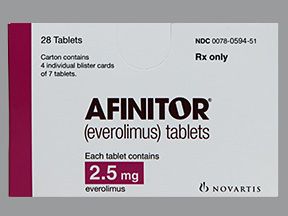Afinitor (everolimus) is a brand-name drug that’s prescribed for certain types of cancers, tumors, and seizures. Afinitor comes as an oral tablet. The dosage can vary depending on what condition the drug is used to treat.
Another version of Afinitor, called Afinitor Disperz, comes as a tablet that you dissolve in water to make an oral suspension (mixture). Both Afinitor and Afinitor Disperz are taken once daily.
Afinitor belongs to a drug class called mammalian target of rapamycin kinase inhibitors. Afinitor and Afinitor Disperz are both available in generic versions called everolimus.
For detailed information on the conditions Afinitor and Afinitor Disperz are prescribed to treat, see our Afinitor overview.
Your doctor will prescribe the right dosage of Afinitor for you based on your condition. You should always take the dosage of Afinitor that your doctor recommends.
Dosage summary
Here is a summary of the forms, strengths, and typical dosages of Afinitor and Afinitor Disperz. Measurements are in milligrams (mg) and mg per meters squared (mg/m2). The m2 measurement is known as your body surface area and is based on your height and weight.
| Drug | Forms | Strengths | Typical dosages |
|---|---|---|---|
| Afinitor | oral tablet | • 2.5 mg • 5 mg • 7.5 mg • 10 mg | • 10 mg once daily • 4.5 mg/m2 once daily |
| Afinitor Disperz | tablet that you dissolve in water | • 2 mg • 3 mg • 5 mg | • 4.5 mg/m2 once daily • 5 mg/m2 once daily |
Afinitor forms
Afinitor comes in two forms. It comes as an oral tablet called Afinitor. It also comes as a tablet that you dissolve in water to make an oral suspension (mixture). This is called Afinitor Disperz.
Afinitor strengths
The Afinitor tablet comes in four strengths:
- 2.5 mg
- 5 mg
- 7.5 mg
- 10 mg
The Afinitor Disperz tablet comes in three strengths:
- 2 mg
- 3 mg
- 5 mg
Typical dosage schedules
The following information describes dosages that are commonly prescribed or recommended. However, be sure to take the dosage your doctor prescribes for you. Your doctor will determine the best starting dosage and dosage schedule to fit your needs.
The table summarizes the recommended Afinitor dosage information for the following conditions:
| Condition(s) | Group(s) approved for | Approved form(s) for this condition | Typical dosage |
|---|---|---|---|
| certain types of breast cancer, kidney cancer, neuroendocrine tumors,* and noncancerous kidney tumors† | adults | Afinitor | 10 mg once daily |
| subependymal giant cell astrocytoma brain tumor† | adults and children ages 1 year and older | Afinitor and Afinitor Disperz | 4.5 mg/m2 once daily‡ |
| focal onset seizures (also known as partial onset seizures)† | adults and children ages 2 years and older | Afinitor Disperz | 5 mg/m2 once daily‡ |
* These are tumors that affect your hormones and are in your pancreas, lungs, stomach, or intestines.
† For this condition, Afinitor is used in people who have tuberous sclerosis complex (TSC), a genetic disease.
‡ This dosage is based on your height and weight. Depending on how well Afinitor works for you, your doctor may recommend a change in your dosage. For more information, see the “Factors that can affect your dosage” section later in this article.
Children’s dosages
Afinitor and Afinitor Disperz are approved for use in children who have TSC with a certain type of brain tumor. Afinitor Disperz is also approved to treat seizures associated with TSC in children. Similar to adults, the dosages of these medications are based on a child’s height and weight.
For specific dosing recommendations and administration information, see the “Typical dosages” section earlier in this article.
Long-term treatment
Afinitor is meant to be a long-term treatment. If you and your doctor determine that Afinitor is safe and effective for you, you’ll likely take it long term.
If you miss a dose of Afinitor or Afinitor Disperz, your next dose depends on when your original dose was due:
- If it’s been fewer than 6 hours since you were supposed to take your dose, take your missed dose.
- If it has been more than 6 hours since your missed dose, skip the missed dose. Continue with your regular dosing schedule.
Do not take more than one dose to try to make up for a missed dose. This may cause side effects.
If you have questions about when to take your dose after a missed dose, talk with your doctor or pharmacist.
To help make sure that you don’t miss a dose, try using a medication reminder. This can include setting an alarm or using a timer. You could also download a reminder app on your phone.
It’s important that you don’t take more Afinitor than your doctor prescribes. For some medications, taking more than the recommended amount may lead to side effects or overdose.
If you take more than the recommended amount of Afinitor
Call your doctor right away if you believe you’ve taken too much Afinitor. Another option is to call America’s Poison Control Centers at 800-222-1222 or use its online tool. If you have severe symptoms, immediately call 911 or your local emergency number, or go to the nearest emergency room.
The Afinitor dosage your doctor prescribes will depend on several factors. These include:
- the type of condition you’re taking Afinitor to treat
- the form of Afinitor you take
- your age
- your height and weight
Other medical conditions you have can also affect your Afinitor dosage.
Dosage adjustments
Certain people taking Afinitor or Afinitor Disperz may need a different dose than what’s typically recommended for their condition. This includes people who:
If you’re taking either medication for a brain tumor or Afinitor Disperz for seizures, your doctor will measure how much drug is in your blood. Then, they may adjust your dose based on how much drug is in your body. This is done to be sure that you’re getting the right amount of medication for your condition.
Your doctor will recommend the dose of Afinitor or Afinitor Disperz for you based on many different factors. It’s important that you always take the dose that your doctor prescribes.
You should take your dose of Afinitor or Afinitor Disperz around the same time each day. And you should be consistent with the way that you take your dose. Specifically, if you take your dose with food, you should always take it with food each day. However, if you take it on an empty stomach, you should continue taking it on an empty stomach. Doing this helps keep a consistent amount of the drug in your body.
The following sections provide information about how to take each form of Afinitor. For full details and instructions on how to take Afinitor or Afinitor Disperz, see the instructions for use that come with the drug. If you have questions on how to take your dose, you can also ask your doctor or pharmacist.
How to take Afinitor
Afinitor is an oral tablet that is taken once daily. You should swallow the tablet whole. Breaking, crushing, or chewing Afinitor tablets may affect how your body absorbs the drug.
If you have trouble swallowing the Afinitor tablet, you may be able to take Afinitor Disperz instead.
How to take Afinitor Disperz
Afinitor Disperz comes as a tablet that you’ll dissolve in water to form a suspension (mixture). Do not break, crush, or chew Afinitor Disperz tablets. This can affect how your body absorbs the drug.
If you’re prescribed Afinitor Disperz, your dosage should be taken with a 10-milliliter syringe or a small cup. If your dose is greater than 10 mg, you will need to use two syringes.
Also, it’s important to note that once you mix the suspension, you should take your dose within 60 minutes. If you cannot take your dose within 60 minutes, you should discard the suspension. Be sure to talk with your doctor or pharmacist about how to discard the medication safely.
For more detailed instructions on how to dissolve the Afinitor Disperz tablet and take your dose correctly, see our Afinitor overview.
The dosages in this article are typical dosages provided by the drug manufacturer. If your doctor recommends Afinitor for you, they will prescribe the dosage that’s right for you. Always follow the dosage that your doctor prescribes for you.
As with any drug, never change your dosage of Afinitor without your doctor’s recommendation. If you have questions about the dosage of Afinitor that’s right for you, talk with your doctor.
Besides learning about dosage, you may want other information about Afinitor and Afinitor Disperz. These additional articles might be helpful to you:
- More about Afinitor: For information about other aspects of Afinitor, refer to this Afinitor overview.
- Side effects: To learn about side effects of Afinitor, see this Afinitor side effects article or refer to the drug’s prescribing information.
- Drug comparison: To find out how Afinitor compares with Ibrance, see this Afinitor vs. Ibrance comparison.
- Interactions: Learn more in this Afinitor interactions article.
- Details about cancer and seizures: For details about the conditions Afinitor is prescribed to treat, our cancer and breast cancer hubs may be helpful. You can also read these epilepsy articles.
Disclaimer: Medical News Today has made every effort to make certain that all information is factually correct, comprehensive, and up to date. However, this article should not be used as a substitute for the knowledge and expertise of a licensed healthcare professional. You should always consult your doctor or another healthcare professional before taking any medication. The drug information contained herein is subject to change and is not intended to cover all possible uses, directions, precautions, warnings, drug interactions, allergic reactions, or adverse effects. The absence of warnings or other information for a given drug does not indicate that the drug or drug combination is safe, effective, or appropriate for all patients or all specific uses.



